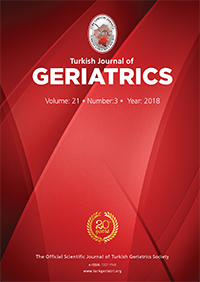2Kadıköy Florence Nightingale Medical Center, Chest Disease Clinic, İstanbul, Turkey
3Adnan Menderes University, Faculty of Medicine, Department of Biostatistic, Aydın, Turkey DOI : 10.31086/tjgeri.2018344052 Introduction: Compliance with spirometry may be disturbed among elderly patients, leading to difficulties in diagnosis and treatment. Contradicting studies exist concerning the quality of spirometry measurements, particularly among patients with cognitive disorders. We studied the effect of cognitive functions on spirometry testing time and pulmonary function test (PFT) parameters among patients aged ≤65 years.
Materials and Method: The study was conducted in the Pulmonary Function Laboratory of our hospital between January and June 2015. A total of 336 subjects aged >45 years who never underwent PFT were included. Patients were categorized as those aged ≤65 years (Group 1) and those aged 45-65 years(Group 2). Mini-Mental State Examination (MMSE) scores of ≤24 were considered normal, whereas those of 18?23 indicated mild cognitive dysfunction.
Results: Groups 1 (132 subjects) and 2 (204 subjects) had similar male-to-female ratios. Six (1.8%) patients were excluded because their spirometry was not properly performed. Forced expiratory volume in 1st second (FEV1 % predicted), forced vital capacity (FVC % predicted), FEV1/FVC %, and MMSE results were significantly lower in Group 1 than in Group 2. No significant difference was noted between the groups regarding spirometry testing time and the number of maneuvers. MMSE negatively correlated with age and the number of spirometry maneuvers and positively with FEV1 % and FVC %. The prevalence of obstructive pulmonary disorders was higher in Group 1. Logistic regression analysis revealed age, body mass index, and smoking history as factors affecting obstruction.
Conclusion: Evaluation of cognitive function before performing spirometry testing in elderly patients is essential for accurate and reliable test results.
Keywords : Spirometry; Cognition; Aged; Mental Status and Dementia Tests
